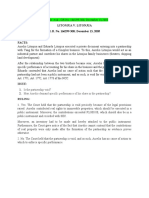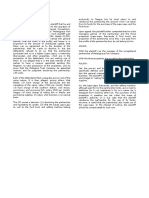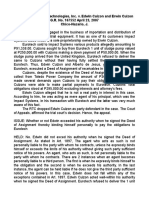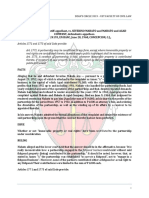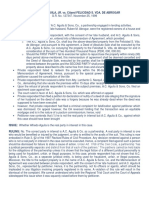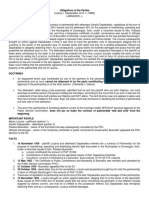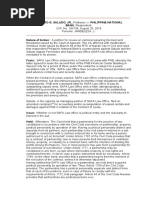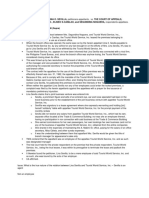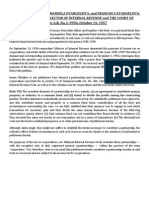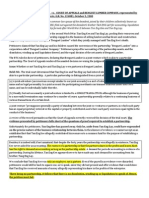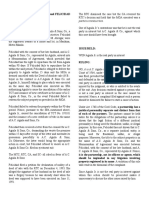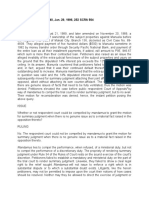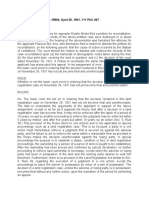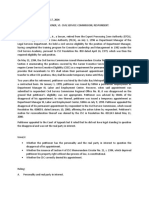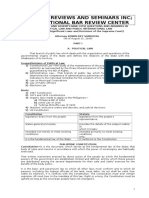0 ratings0% found this document useful (0 votes)
765 viewsTorres v. Court of Appeals
Torres v. Court of Appeals
Uploaded by
Gia DimayugaSisters Antonia Torres and Emeteria Baring entered into a joint venture agreement with Manuel Torres for developing land into a subdivision. They executed a deed of sale in Manuel's favor and he obtained a loan by mortgaging the property. They agreed to share proceeds from lot sales. However, the project failed and the land was foreclosed. The sisters argue the agreement is void under Article 1773 for failing to attach an immovable property inventory. The Court held that failure to attach the inventory does not void the partnership when no third parties are involved and the partners treated the agreement as binding between them.
Copyright:
© All Rights Reserved
Available Formats
Download as DOCX, PDF, TXT or read online from Scribd
Torres v. Court of Appeals
Torres v. Court of Appeals
Uploaded by
Gia Dimayuga0 ratings0% found this document useful (0 votes)
765 views3 pagesSisters Antonia Torres and Emeteria Baring entered into a joint venture agreement with Manuel Torres for developing land into a subdivision. They executed a deed of sale in Manuel's favor and he obtained a loan by mortgaging the property. They agreed to share proceeds from lot sales. However, the project failed and the land was foreclosed. The sisters argue the agreement is void under Article 1773 for failing to attach an immovable property inventory. The Court held that failure to attach the inventory does not void the partnership when no third parties are involved and the partners treated the agreement as binding between them.
Original Description:
Partnership
Copyright
© © All Rights Reserved
Available Formats
DOCX, PDF, TXT or read online from Scribd
Share this document
Did you find this document useful?
Is this content inappropriate?
Sisters Antonia Torres and Emeteria Baring entered into a joint venture agreement with Manuel Torres for developing land into a subdivision. They executed a deed of sale in Manuel's favor and he obtained a loan by mortgaging the property. They agreed to share proceeds from lot sales. However, the project failed and the land was foreclosed. The sisters argue the agreement is void under Article 1773 for failing to attach an immovable property inventory. The Court held that failure to attach the inventory does not void the partnership when no third parties are involved and the partners treated the agreement as binding between them.
Copyright:
© All Rights Reserved
Available Formats
Download as DOCX, PDF, TXT or read online from Scribd
Download as docx, pdf, or txt
0 ratings0% found this document useful (0 votes)
765 views3 pagesTorres v. Court of Appeals
Torres v. Court of Appeals
Uploaded by
Gia DimayugaSisters Antonia Torres and Emeteria Baring entered into a joint venture agreement with Manuel Torres for developing land into a subdivision. They executed a deed of sale in Manuel's favor and he obtained a loan by mortgaging the property. They agreed to share proceeds from lot sales. However, the project failed and the land was foreclosed. The sisters argue the agreement is void under Article 1773 for failing to attach an immovable property inventory. The Court held that failure to attach the inventory does not void the partnership when no third parties are involved and the partners treated the agreement as binding between them.
Copyright:
© All Rights Reserved
Available Formats
Download as DOCX, PDF, TXT or read online from Scribd
Download as docx, pdf, or txt
You are on page 1of 3
4. Torres v.
Court of Appeals (Gail)
Dec 9, 1999 | Panganiban, J. | Formalities Required (Partnership) FACTS:
1. Sisters Antonia Torres and Emeteria Baring (petitioners), entered into a
PETITIONER: Antonia Torres and Emeteria Baring “joint venture agreement” (JVA) with Manuel Torres (respondent) for the
RESPONDENT: Court of Appeals and Manuel Torres development of a parcel of land into a subdivision. They executed a Deed
of Sale covering said land in favor of Manuel, who then had it registered
SUMMARY: Sisters Antonia Torres and Emeteria Baring (petitioners), entered in his name.
into a JVA with Manual Torres (respondent) for the development of land into 2. By mortgaging the property, Manuel obtained from Equitable Bank a loan
subdivision. They executed a Deed of Sale in favor of Manuel. He registered it of P40,000 which, under the JVA, was to be used for the development of
under his name and obtained a P40,000 loan from Equitable Bank by mortgaging
the subdivision. All three of them also agreed to share the proceeds from
the property. All 3 of them also agreed to share the proceeds from the sale of the
subdivided lots. However, the project did not push through and the land was the sale of the subdivided lots.
foreclosed by the Bank. Petitioners argue that the JVA is void under Art. 1773 3. However, the project did not push through and the land was subsequently
since the parties did not make, sign, or attach to the public instrument an foreclosed by the bank.
inventory of the real property contributed. 4. According to petitioners, the project failed because of “respondent’s lack
ISSUE: WON the partnership is void for failure to prepare an inventory of of funds or means and skills.” They add that respondent used the loan not
immovable property contributed? NO for the development of the subdivision, but in furtherance of his own
HELD: Failure to prepare an inventory of immovable property contributed,
company, Universal Umbrella Company.
would not render the partnership void when:
(a) No third-party is involved since Art. 1773 was intended for the protection 5. Respondent Manuel alleged that he used the loan to implement the
of third parties; and Agreement. With the said amount,
(b) partners have made a claim on the partnership agreement which is a. he was able to effect the survey and the subdivision of the lots
deemed binding between them as any other contract b. He caused the construction of roads, curbs and gutters.
c. He entered into a contract with engineering firm for the building
DOCTRINE: of 60 low-cost housing units and even set up a model house on
1. GENERAL RULE: Art. 1773. A contract of partnership is void, one of the subdivision lots.
whenever immovable property is contributed thereto, if an inventory of d. He did all these for a total expense of P85,000
said property is not made, signed by the parties, and attached to the 6. Respondent claimed that the subdivision project failed, however, because
public instrument. petitioners and their relatives had separately caused the annotations of
2. EXCEPTION: adverse claims on the title to the land, which eventually scared away
a. No third-party is involved since Art. 1773 was intended for prospective buyers. Despite his requests, petitioners refused to cause the
the protection of third parties; and clearing of the claims, thereby forcing him to give up on the project.
b. partners have made a claim on the partnership agreement 7. Petitioners filed a civil case before the RTC Cebu which was later
which is deemed binding between them as any other dismissed by RTC and CA.
contract - CA held that petitioner and respondent formed partnership for the
development of the subdivision. Thus, they must bear the loss
suffered by the partnership in the same proportion as their share bind themselves to contribute money, property, or industry to a common
in the profits stipulated in the contract. fund, with the intention of dividing the profits among themselves.
8. Hence, this petition. Petitioners argue that the JVA is void under Art. 1773 4. Petitioners would contribute property to the partnership in the form of land
of the CC, which provides: which was to be developed into a subdivision; while respondent would
- Art. 1773. A contract of partnership is void, whenever immovable give, in addition to his industry, the amount needed for general expenses
property is contributed thereto, if an inventory of said property is and other costs. Furthermore, the income from the said project would be
not made, signed by the parties, and attached to the public divided according to the stipulated percentage. Clearly, the contract
instrument. manifested the intention of the parties to form a partnership.
9. Petitioners contend that since the parties did not make, sign or attach to the 5. Respondent's actions (fact #5 enumeration - construction of roads, etc.)
public instrument an inventory of the real property contributed, the clearly belie petitioners' contention that he made no contribution to the
partnership is void. partnership. Under Article 1767 of the Civil Code, a partner may
contribute not only money or property, but also industry.
ISSUE: RELEVANT ISSUE:
1. MAIN ISSUE: WON a partnership exist? - YES PARTNERSHIP IS NOT VOID UNDER ART. 1773 FOR FAILURE TO
2. RELEVANT ISSUE: WON the partnership is void for failure to prepare PREPARE AN INVENTORY OF IMMOVABLE PROPERTY CONTRIBUTED
an inventory of immovable property contributed? - NO 1. First, Art. 1773 was intended primarily to protect third persons. Thus,
under the aforecited provision which is a complement of Art. 1771, “the
RATIO: execution of a public instrument would be useless if there is no inventory
of the property contributed, because without its designation and
MAIN ISSUE: description, they cannot be subject to its inscription in the Registry of
1. Petitioners deny having formed a partnership with respondent. They Property, and their contribution cannot prejudice third persons. This will
contend that the Joint Venture Agreement and the earlier Deed of Sale, result in fraud to those who contract with the partnership in the belief in
both of which were the bases of the appellate court's finding of a the efficacy of the guaranty in which the immovable may consist. Thus,
partnership, were void. the contract is declared void by law when no such inventory is made.” The
2. In the same breath, however, they assert that under those very same case at bar does not involve 3rd parties who may be prejudiced.
contracts, respondent is liable for his failure to implement the project. 2. Second, petitioner themselves invoke the allegedly void contract as basis
Because the agreement entitled them to receive 60 percent of the proceeds for their claim that respondent should pay them 60 percent of the value of
from the sale of the subdivision lots, they pray that respondent pay them the property. They cannot in one breath deny the contract and in
damages equivalent to 60% of the value of the property. another recognize it, depending on what momentarily suits their
3. SC held that a reading of the terms embodied in the Agreement indubitably purpose. Parties cannot adopt inconsistent position in regard to a contract
shows the existence of a partnership pursuant to Article 1767 of the Civil and courts will not tolerate, much less approved, such practice.
Code, which provides: By the contract of partnership two or more persons 3. In short, the alleged nullity of the partnership will not prevent courts from
considering the Joint Venture Agreement an ordinary contract from which
the parties' rights and obligations to each other may be inferred and
enforced.
4. CLV OUTLINE:
Failure to prepare an inventory of immovable property contributed,
would not render the partnership void when:
(a) No third-party is involved since Art. 1773 was intended
for the protection of third parties; and
(b) partners have made a claim on the partnership agreement
which is deemed binding between them as any other contract
You might also like
- New Business CertificateDocument1 pageNew Business CertificateDumitru PetricaNo ratings yet
- Litonjua, JR v. Litonjua, Sr. Et Al., GR No. 166299-300, December 13,2005Document1 pageLitonjua, JR v. Litonjua, Sr. Et Al., GR No. 166299-300, December 13,2005Aphrobit Clo100% (2)
- 1 Agad vs. Mabato, G.R. No. L-24193, June 28, 1968Document4 pages1 Agad vs. Mabato, G.R. No. L-24193, June 28, 1968Francis Leo TianeroNo ratings yet
- ATP MORAN vs. CADocument2 pagesATP MORAN vs. CARomnick Jesalva100% (1)
- Teague vs. Martin, 53 Phil. 504Document1 pageTeague vs. Martin, 53 Phil. 504Ella Tho100% (1)
- 14-ATP-Escueta vs. LimDocument2 pages14-ATP-Escueta vs. LimJoesil DianneNo ratings yet
- Eurotech Industrial Technologies Inc Vs CuizonDocument2 pagesEurotech Industrial Technologies Inc Vs CuizonShauna Herrera100% (1)
- (CASE DIGEST) Agad vs. MabatoDocument2 pages(CASE DIGEST) Agad vs. MabatoLorjyll Shyne Luberanes Tomarong100% (2)
- Article 1868Document3 pagesArticle 1868Paul Christopher PinedaNo ratings yet
- Irma Idos V Court of Appeals - Gr. No. 110782Document2 pagesIrma Idos V Court of Appeals - Gr. No. 110782Symon Angelo100% (2)
- Aguila JR v. Court of Appeals, G.R. No. 127347, November 25, 1999Document1 pageAguila JR v. Court of Appeals, G.R. No. 127347, November 25, 1999Lyle Bucol100% (2)
- Partnership Digest Obillos Vs CIRDocument2 pagesPartnership Digest Obillos Vs CIRJeff Cadiogan Obar100% (10)
- 07 Torres vs. Court of Appeals, GR No. 134559, December 9, 1999 PDFDocument8 pages07 Torres vs. Court of Appeals, GR No. 134559, December 9, 1999 PDFMark Emmanuel LazatinNo ratings yet
- Evangelista v. Abad SantosDocument2 pagesEvangelista v. Abad SantosCourtney TirolNo ratings yet
- Litonjua Jr. v. Litonjua SRDocument3 pagesLitonjua Jr. v. Litonjua SRGia DimayugaNo ratings yet
- Munasque Vs CADocument2 pagesMunasque Vs CAIsha SorianoNo ratings yet
- Estanislao V CA - AgencyDocument2 pagesEstanislao V CA - AgencyDawn BernabeNo ratings yet
- Goquiolay v. Sycip GR No. L-11840 July 26, 1960 FactsDocument2 pagesGoquiolay v. Sycip GR No. L-11840 July 26, 1960 FactsJoesil Dianne SempronNo ratings yet
- Litton v. Hill and CeronDocument3 pagesLitton v. Hill and CeronkdescallarNo ratings yet
- Singson Vs Isabela SawmillDocument2 pagesSingson Vs Isabela SawmillvanessadelatadoNo ratings yet
- Mod1 - 9 - G.R. No. L-5236 Martinez V Ong Pong CoDocument2 pagesMod1 - 9 - G.R. No. L-5236 Martinez V Ong Pong CoOjie SantillanNo ratings yet
- Cir Vs Suter - DigestDocument1 pageCir Vs Suter - DigestXing Keet Lu100% (2)
- AtpDocument38 pagesAtpAllan VioletaNo ratings yet
- Goquiolay v. SycipDocument6 pagesGoquiolay v. Sycipkim_santos_20No ratings yet
- Heirs of Lim v. LimDocument2 pagesHeirs of Lim v. LimGia DimayugaNo ratings yet
- Mod1 - 4 - G.R. No. 78133 Pascual V CIR - DigestDocument2 pagesMod1 - 4 - G.R. No. 78133 Pascual V CIR - DigestOjie Santillan100% (1)
- 41 US V ClarinDocument1 page41 US V ClarinNichole LanuzaNo ratings yet
- 08 Aguila Vs CADocument1 page08 Aguila Vs CANichole LanuzaNo ratings yet
- Case Summary: Obligations of The PartiesDocument2 pagesCase Summary: Obligations of The Partieskim_santos_20100% (1)
- ANICETO G. SALUDO, JR., Petitioner, v. PHILIPPINE NATIONALDocument1 pageANICETO G. SALUDO, JR., Petitioner, v. PHILIPPINE NATIONALabbywinster0% (1)
- George Litton V Hill and Ceron, G.R. No. L45624, April 25, 1939-DigestedDocument1 pageGeorge Litton V Hill and Ceron, G.R. No. L45624, April 25, 1939-DigestedRaymer OclaritNo ratings yet
- TOCAO vs. CADocument2 pagesTOCAO vs. CAPatricia Sanchez100% (4)
- Digest - Villareal vs. RamirezDocument1 pageDigest - Villareal vs. RamirezPaul Vincent Cunanan100% (1)
- Jose Fernandez vs. Francisco Dela RosaDocument2 pagesJose Fernandez vs. Francisco Dela RosaValora France Miral AranasNo ratings yet
- Evangelista v. Abad SantosDocument4 pagesEvangelista v. Abad Santoslucky javellana100% (1)
- Anton Vs OlivaDocument2 pagesAnton Vs Olivaj531823100% (1)
- Sevilla Vs CA (Supra)Document3 pagesSevilla Vs CA (Supra)Shammah Rey MahinayNo ratings yet
- Lozana vs. Depakakibo GR No. L-13680, April 27, 1960Document2 pagesLozana vs. Depakakibo GR No. L-13680, April 27, 1960SHARIEF ABBAS ABANTAS0% (1)
- Digest - Evangelista vs. CIRDocument1 pageDigest - Evangelista vs. CIRPaul Vincent Cunanan100% (4)
- Digest of Yu v. NLRC (G.R. No. 97212)Document2 pagesDigest of Yu v. NLRC (G.R. No. 97212)Rafael Pangilinan100% (5)
- 09) US v. ClarinDocument1 page09) US v. ClarinPio Guieb Aguilar100% (1)
- Dan Fue Leung v. IACDocument3 pagesDan Fue Leung v. IACMarichu Castillo Hernandez100% (1)
- Island Sales V United PioneersDocument2 pagesIsland Sales V United Pioneerssmtm06100% (3)
- Digest - Heirs of Tan Eng Kee vs. CADocument1 pageDigest - Heirs of Tan Eng Kee vs. CAPaul Vincent Cunanan100% (2)
- Ortega v. CA - DigestDocument3 pagesOrtega v. CA - DigestJaysieMicabalo100% (1)
- 25Hrs Lim V Lim DigestDocument2 pages25Hrs Lim V Lim DigestXing Keet Lu100% (4)
- Leyte-Samar-Sales and K. Tomassi v. S. Cea and O. CastrillaDocument1 pageLeyte-Samar-Sales and K. Tomassi v. S. Cea and O. CastrillaKelsey Olivar MendozaNo ratings yet
- Sardane Vs Ca DigestDocument1 pageSardane Vs Ca DigestIvy Paz100% (1)
- 19 Villareal v. Ramirez, GR No. 144214 PDFDocument8 pages19 Villareal v. Ramirez, GR No. 144214 PDFMark Emmanuel LazatinNo ratings yet
- Sison V Mcquaid DigestDocument1 pageSison V Mcquaid DigestAia Tmnda100% (2)
- Estanislao, Jr. v. CA, 160 S 830Document1 pageEstanislao, Jr. v. CA, 160 S 830Aphrobit CloNo ratings yet
- Pledge Credit TransDocument2 pagesPledge Credit Transmark_kram02No ratings yet
- Gatchalian Vs CirDocument2 pagesGatchalian Vs Cirmitsudayo_100% (3)
- The Leyte-Samar Sales Co. vs. Sulpicio v. Cea (93 Phil 100, May 20, 1953)Document2 pagesThe Leyte-Samar Sales Co. vs. Sulpicio v. Cea (93 Phil 100, May 20, 1953)Marilyn BachillerNo ratings yet
- 08 Alfredo N. Aguila, JR vs. CA and Felicidad S. Vda. de AbrogarDocument2 pages08 Alfredo N. Aguila, JR vs. CA and Felicidad S. Vda. de Abrogarslumba100% (2)
- Digest - Rojas Vs MaglanaDocument2 pagesDigest - Rojas Vs Maglanaremrase50% (2)
- Bachrach vs. La ProtectoraDocument2 pagesBachrach vs. La ProtectoraLawdemhar Cabatos100% (1)
- Bastida Vs MenziDocument2 pagesBastida Vs MenziAna AdolfoNo ratings yet
- Litton Vs Hill and Ceron (DIGEST)Document2 pagesLitton Vs Hill and Ceron (DIGEST)ckarla80100% (2)
- Goquiolay Vs SycipDocument1 pageGoquiolay Vs Sycipabethzkyyyy100% (1)
- Torres v. Court of Appeals Et Al., G.R. No. 134559 (9 December 1999)Document2 pagesTorres v. Court of Appeals Et Al., G.R. No. 134559 (9 December 1999)Ch R LnNo ratings yet
- Go v. CA, GR 120040, Jan. 29, 1996, 252 SCRA 564Document2 pagesGo v. CA, GR 120040, Jan. 29, 1996, 252 SCRA 564Gia DimayugaNo ratings yet
- Sotto v. Sotto, GR L-17768, Sept. 1, 1922, 43 Phil. 688Document1 pageSotto v. Sotto, GR L-17768, Sept. 1, 1922, 43 Phil. 688Gia Dimayuga100% (1)
- Marcelo v. Mencias, GR 15609, Apr. 29, 1960, 107 Phil. 1071Document1 pageMarcelo v. Mencias, GR 15609, Apr. 29, 1960, 107 Phil. 1071Gia Dimayuga100% (1)
- Ana v. Menla, GR L-15564, April 29, 1961, 111 Phil. 947Document1 pageAna v. Menla, GR L-15564, April 29, 1961, 111 Phil. 947Gia DimayugaNo ratings yet
- Rom v. Cobadora, GR L-24764, July 17, 1969, 128 SCRA 758Document2 pagesRom v. Cobadora, GR L-24764, July 17, 1969, 128 SCRA 758Gia DimayugaNo ratings yet
- Republic v. Marasigan, GR 85515, June 6, 1991, 198 SCRA 219Document1 pageRepublic v. Marasigan, GR 85515, June 6, 1991, 198 SCRA 219Gia Dimayuga100% (1)
- Republic v. CA, GR L-62680, Nov. 9, 1988, 167 SCRA 150Document1 pageRepublic v. CA, GR L-62680, Nov. 9, 1988, 167 SCRA 150Gia DimayugaNo ratings yet
- Lasam v. Director of Lands, GR 42859, Mar. 17, 1938, 65 Phil. 367Document1 pageLasam v. Director of Lands, GR 42859, Mar. 17, 1938, 65 Phil. 367Gia DimayugaNo ratings yet
- Santos, Jr. v. PNOC Exploration Corp., GR 170943, Sept. 23, 2008, 566 SCRA 272)Document1 pageSantos, Jr. v. PNOC Exploration Corp., GR 170943, Sept. 23, 2008, 566 SCRA 272)Gia DimayugaNo ratings yet
- Republic v. Nillas, GR 159595, Jan. 23, 2007, 512 SCRA 286Document2 pagesRepublic v. Nillas, GR 159595, Jan. 23, 2007, 512 SCRA 286Gia DimayugaNo ratings yet
- Heirs of Vencilao, Sr. v. CA, GR 123713, Apr. 1, 1998, 288 SCRA 574Document1 pageHeirs of Vencilao, Sr. v. CA, GR 123713, Apr. 1, 1998, 288 SCRA 574Gia DimayugaNo ratings yet
- Guevara v. Laico, GR 44057, Feb. 27, 1937, 64 Phil. 144Document1 pageGuevara v. Laico, GR 44057, Feb. 27, 1937, 64 Phil. 144Gia DimayugaNo ratings yet
- 18 - Trade Unions of The PH Vs NHCDocument2 pages18 - Trade Unions of The PH Vs NHCGia Dimayuga50% (2)
- Naval v. CA, GR 167412, Feb. 2, 2006, 483 SCRA 102Document1 pageNaval v. CA, GR 167412, Feb. 2, 2006, 483 SCRA 102Gia Dimayuga100% (1)
- Divina v. CA, GR 117734, Feb. 22, 2001, 352 SCRA 527Document1 pageDivina v. CA, GR 117734, Feb. 22, 2001, 352 SCRA 527Gia DimayugaNo ratings yet
- Republic v. CA, GR 103746, Feb. 9, 1993, 218 SCRA 773Document1 pageRepublic v. CA, GR 103746, Feb. 9, 1993, 218 SCRA 773Gia DimayugaNo ratings yet
- Leyva v. Jandoc, GR L-16965, Feb. 28, 1962, 4 SCRA 595Document1 pageLeyva v. Jandoc, GR L-16965, Feb. 28, 1962, 4 SCRA 595Gia DimayugaNo ratings yet
- Laburada v. Land Registration Authority, GR 101387, Mar. 11, 1998, 287 SCRA 333Document1 pageLaburada v. Land Registration Authority, GR 101387, Mar. 11, 1998, 287 SCRA 333Gia DimayugaNo ratings yet
- Regis v. OsmenaDocument3 pagesRegis v. OsmenaGia DimayugaNo ratings yet
- ABELLA Vs CSCDocument4 pagesABELLA Vs CSCGia DimayugaNo ratings yet
- de Los Reyes v. Paterno, Administrator of The Estate of Tomas G. Del Rosario Deceased, GR 10680, Mar. 27, 1916, 34 Phil. 420Document1 pagede Los Reyes v. Paterno, Administrator of The Estate of Tomas G. Del Rosario Deceased, GR 10680, Mar. 27, 1916, 34 Phil. 420Gia DimayugaNo ratings yet
- 9 - Español Vs CSCDocument2 pages9 - Español Vs CSCGia DimayugaNo ratings yet
- CSC v. ALBAODocument4 pagesCSC v. ALBAOGia DimayugaNo ratings yet
- Bell Trade Act 1946Document3 pagesBell Trade Act 1946Miccah Jade CastilloNo ratings yet
- Aoc CV 600 PDFDocument2 pagesAoc CV 600 PDFJohn HaasNo ratings yet
- Kamlesh Human RightsDocument15 pagesKamlesh Human RightsRahul SisodiaNo ratings yet
- SCL1501 Latin PhrasesDocument4 pagesSCL1501 Latin Phrasesnazar.kudiyarovNo ratings yet
- Civil Rights MovementDocument20 pagesCivil Rights Movementapi-294078103No ratings yet
- NSTP Module 2 Lesson 1Document13 pagesNSTP Module 2 Lesson 1Andrea WaganNo ratings yet
- Chapter 12: Conditions and WarrantiesDocument10 pagesChapter 12: Conditions and WarrantiesNicole PTNo ratings yet
- Guardians and Wards ActDocument21 pagesGuardians and Wards ActShivanand BorkarNo ratings yet
- The Impact of Speed Radars On Drivers' Behavior: A Case Study in DubaiDocument8 pagesThe Impact of Speed Radars On Drivers' Behavior: A Case Study in DubaiddNo ratings yet
- G.R. No. 215922, October 01, 2018 Lease ContractDocument9 pagesG.R. No. 215922, October 01, 2018 Lease Contractyvettequebral163No ratings yet
- Co Created Plan PresentationDocument19 pagesCo Created Plan PresentationGov_Cluster_SecretariatNo ratings yet
- Mechanic's Liens: (Reprinted With Permission From NACM's Manual of Credit and Commercial Laws, 104 Edition)Document95 pagesMechanic's Liens: (Reprinted With Permission From NACM's Manual of Credit and Commercial Laws, 104 Edition)Lenza Mcelrath100% (2)
- Consular Electronic Application Center - Print ApplicationDocument7 pagesConsular Electronic Application Center - Print Applicationreview bazaarNo ratings yet
- Ronald Dworkin On AdjudicationDocument14 pagesRonald Dworkin On AdjudicationSuryapratap singh jodhaNo ratings yet
- Part 1 Political Law Reviewer by Atty Sandoval PDFDocument161 pagesPart 1 Political Law Reviewer by Atty Sandoval PDFrosanie remotinNo ratings yet
- Lesson 4: Codes of ConductDocument9 pagesLesson 4: Codes of ConductMark EdisonNo ratings yet
- Welcome Letter IDEP169831873135LAWO 692816391183734Document14 pagesWelcome Letter IDEP169831873135LAWO 692816391183734tucker078605No ratings yet
- Laws of Malaysia Sport Development Act 1997 Act 576Document28 pagesLaws of Malaysia Sport Development Act 1997 Act 576pilonzNo ratings yet
- Chapter 1 To 4Document9 pagesChapter 1 To 4mnhammadNo ratings yet
- Lecture NotesDocument32 pagesLecture NotesRavinesh PrasadNo ratings yet
- Qty - 366 Nos Material - UNS F33100 / ASTM A536 65-45-12: Z002BX0D A Ecn NoDocument1 pageQty - 366 Nos Material - UNS F33100 / ASTM A536 65-45-12: Z002BX0D A Ecn Nosudipta dasNo ratings yet
- Expropriated Properties Act 1983 (CH 87)Document12 pagesExpropriated Properties Act 1983 (CH 87)mustapha lubegaNo ratings yet
- Inglés Intermedio - Evidencia 1Document2 pagesInglés Intermedio - Evidencia 1armpenuNo ratings yet
- Portaria PTM PMDFDocument4 pagesPortaria PTM PMDFLeandro QueirozNo ratings yet
- A.C. No. 5581Document5 pagesA.C. No. 5581Jon SantiagoNo ratings yet
- In Re Philippine National Bank v. United States District Court For The District of HawaiiDocument7 pagesIn Re Philippine National Bank v. United States District Court For The District of HawaiiPhulagyn CañedoNo ratings yet
- Subject-Law of Property Topic - Transfer To An Unborn PersonDocument17 pagesSubject-Law of Property Topic - Transfer To An Unborn PersonAnonymous J53erBT30QNo ratings yet
- Jones v. Wackenhut % Google Inc. - Document No. 57Document7 pagesJones v. Wackenhut % Google Inc. - Document No. 57Justia.comNo ratings yet
- Evidence SLU School of LawDocument16 pagesEvidence SLU School of LawAntonJohnVincentFriasNo ratings yet

